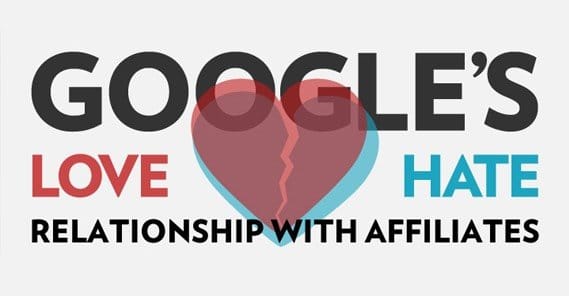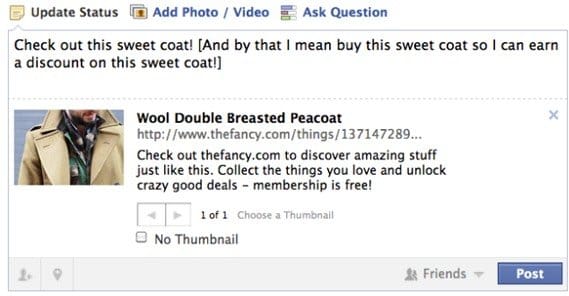Does Google Penalize Sites That Have Affiliate Links?

Affiliate marketing has a long and tricky history as a strategy for internet marketing. It has existed pretty much as long as the concept of recommendations and word of mouth advertising has existed, which is to say, since the dawn of commerce. As long as there have been people willing to recommend a product, there have been businesses willing to pay for those recommendations.
Part of the reason affiliate marketing has a bad rap online is because of the strategies used to implement it. To understand those, both good and bad, you need to understand how affiliate marketing works.
How Affiliate Marketing Works
Woah, look at that! Here we are at the topic already.
Online, modern affiliate marketing works either by URL parameters or cookies, typically cookies. The idea is that you as a marketer register to be part of an affiliate program with a business. Usually, you like that business, and you’re willing to genuinely recommend them to other people. It’s something you do anyway, so why not get paid for doing it?
So, you have a relationship with a business. That business gives you a special link that you use when you promote that business. Instead of saying “hey, www.greatbusiness.com is a great business, check it out!” you would say something like “hey, www.greatbusiness.com/A4th57Q is a great business, check it out!” There’s not a lot of difference between the two links, one just doesn’t look quite as good. They both take the user to the homepage.
The A4th57Q is your affiliate ID, in this circumstance. When a user clicks that link, the business says “oh, look, Bob sent us this customer.” Then they track that customer. If that customer makes a purchase, the business then rewards you for the referral, typically in a percentage of the cost of whatever the customer purchased.
There are a few tricks with this, both good and bad, that happen along the way. There are a lot of modifiers to the situation. For example:
- If the customer has a script blocker, their access to the business site might not be tracked, and you wouldn’t be paid for the referral.
- If the customer removes your affiliate ID before clicking the link, or just navigates to the site on their own, your referral isn’t registered.
- If the business isn’t very accurate with their tracking – or they’re a little malicious – they can “lose” track of the customer and not pay you for a legitimate referral.
On top of that, you have affiliate networks. Affiliate networks are third parties who come in and talk to 100 businesses and get deals with all of their affiliate programs. They then refer the affiliate programs on to you, at a lower commission. Instead of referring traffic directly to the business with an affiliate ID from that business, you refer traffic via a link to the affiliate network, which redirects through their affiliate ID and to the business.
In this situation, the customer clicks on your link, is directed through the network, and is thus delivered to the business. They make a $50 purchase and the business pays the affiliate network $5, and the network in turn pays you $3.
This can be both good and bad. On the bad side, of course, you’re making $3 on that sale where you would be making $5 with a direct relationship to the business. The benefit, though, is that the affiliate network can make deals with businesses that don’t have individual affiliate programs. If www.greatbusiness.com doesn’t want to work with people, they might work with a network instead.
In this situation the network has a lot of benefits for the business. They filter out fake traffic and unqualified customers, for example, so the business doesn’t risk paying out for fake customers.
On the other hand, the network can also skim traffic off the top. Maybe one out of every 10 customers pays the affiliate network but doesn’t pay the actual referrer. Maybe the network is a little shady, and has a minimum payout of $100, but tends to find reasons to cancel accounts at $90. There are also affiliate networks out there that are a middleman for a middleman, so that $5 paid to the network becomes $3 paid to another network which becomes $1 paid to you.
You can see, then, how it can quickly become a mess.
Why Affiliate Networking has a Bad Reputation
Already, you can see some reasons from the marketer’s perspective why affiliate marketing has issues. When you sign up for a network, you’re hoping that the network is on the up and up. If they aren’t, you’re losing out, and you might not even know unless you’re very careful with monitoring your stats. It’s also very easy to break a term in the terms of service of a network and lose everything overnight. This leads a lot of young marketers to be once bitten, twice shy, and prone to badmouthing affiliate marketing as a whole.
There’s also plenty that can go wrong with the relationship between the marketer and the customer, or between the marketer and the business. For example, if the marketer buys a bunch of traffic from Pakistan for an affiliate that pays per lead, they might get paid for leads that had no intention of buying. It’s a scam, and businesses don’t like that loss.
The thing is, what this is all leading up to is how affiliate links and search engines interact. That means Google. Google doesn’t care much about the relationship between a marketer and a business. They’re not policing referral relationships. They might help you track it all with Google Analytics, but they aren’t monitoring your stats and trying to warn businesses of fraud.
No, Google is primarily concerned with the relationship between the customer and the marketer. The reason for that is because 99% of the time, the customer finds the marketer through a Google search. The customer is interested in buying a hammer, so they do a Google search for “best construction hammer” and are taken to “thebestconstructionhammers.com.” On this site they can read a bunch of reviews of hammers, pick the one they like the best, and lo and behold there’s a buy now link right there in the review! Such convenience! They click it, they buy the hammer, and they’re happy.
Of course, this buy link is a referral link and the marketer is getting paid for the referral. But what happens when any part of that process is tainted? What if the marketer is writing a 5-star review for a cheap hammer that breaks when it’s used, specifically because it’s an expensive hammer that earns them more on the commission? What if the marketer says they get nothing out of it, when they’re really getting paid?
Google has a vested interest in providing the highest quality content to the people who use their service. That’s what the search engine is all about, it’s what SEO is all about, and it’s what has made them the success they are today. If a bunch of users are looking for hammers and they’re referred to a site that has a lot of lies about bad hammers, those people are going to be unhappy both with that site and with Google for recommending that site. They’ll be skeptical of Google and will be less likely to use it in the future.
So, Google tends to be very picky, very strict, with what you can and cannot do with affiliate links. Google also has to contend with the legalities of affiliate links, like how the FTC has strict regulations about disclosure for affiliate links. I don’t know how often the FTC takes action against websites that don’t disclose their affiliations, but I do know that Google makes it less useful to hide that relationship.
How Google Treats Affiliate Links
Google is not actively antagonistic towards affiliate links. Heck, they run an affiliate program of their own. What they’re antagonistic towards is the abuse of such links. Here are some of the ways abuse comes up:
- Forcing users to pass through an affiliate link via a redirect.
- Forcing users to fill out an affiliate offer to reach content.
- Cloaking the affiliate nature of a link.
- Spamming affiliate links too many times on a single page.
- Misrepresenting social media posts with an affiliate link.
- Trying to game search results with other black hat techniques, like exact match domains and keyword abuse.
To briefly explain black hat, you need to go back to the concept of hackers and affinities. Think spy versus spy, that old comic about two spies planning and countering each others plans. One wore white, and was the “good guy.” One wore black and was the bad. This is an indication of the concept, and how it applied to hackers.
Black hat hackers were the malicious people using scripts, phishing, and code to hack sites, steal information, and make money. They’re looking to steal identities and compromise bank accounts. White hat hackers, by contrast, are security contractors. They do the same thing, trying to find exploits and loopholes to breach sites, but when they find a hole they inform the company and give them a fix. They exist to fight black hat hackers.
In marketing, black hat refers to the techniques and technologies that exploit loopholes, hide malicious activity, and generally make the web a more dangerous place. Everything from cloaked affiliate links to auto-download viruses can be considered black hat. By contrast, white hat techniques are the legitimate growth techniques, like publishing great content and building a social media following.
Black hat techniques are the sort of techniques that Google really doesn’t like. They’re a sign of a marketer who wants to abuse the goodwill of the search engine and the trust of customers who don’t know any better. Of course, they’re not even a sure sign of malicious intent. Just take a look at this famous case study from Niche Pursuits. The site in question was ranking well and performing well making money with affiliate marketing, when a Google penalty came out of nowhere. It wasn’t link building that hurt him, it wasn’t keyword use, it wasn’t poor content; a nearly identical site in a different niche was ranking #1 and working well. The only difference?
Affiliate links en masse. He had created large tables of products to compare, and had two links to each product in the table, creating individual pages with 100+ affiliate links. That, my friends, is too much. Even if at the outset the content looks useful, it’s still low word count content with a huge number of links. To Google, that looks bad.
Matt Cutts is quoted as saying that in most cases, Google doesn’t treat affiliate links any different from normal links. Honestly, this is pretty true. That same table grid with regular links instead of affiliate links would probably be hit the same way.
You can nofollow your affiliate links if you like, but for the most part it doesn’t matter. The destination of the affiliate link is usually something like Amazon, and they certainly don’t need, rely on, or care too much about the SEO value of the links you’re sending their way. Google recognizes this and also doesn’t really care. I’m sure if they wanted they could deindex Amazon, but I doubt it would actually hurt the business much at all.
If you want to be risky, you can try to cloak your affiliate links from Google. ShoutMeLoud has a guide for this using a WordPress plugin that hides them, nofollows them, and a robots.txt directive that keeps Google from crawling them.
Honestly, I don’t recommend using this method. It’s really, to me, a bad idea. What you’re doing with cloaking links from Google is doubling down. You’re saying “I acknowledge that my use of affiliate links is potentially detrimental to my search ranking, but rather than use them in a more appropriate way, I choose to hide my activity from discovery so that I am not penalized.” In other words, trying to get out of a car chase by taking potshots at the cop.
I don’t know if the method works or not. They claim it does, but it could at any point stop working, and that’s always the problem with black at techniques. Black hat techniques work, or else no one would use them, but they are discovered and circumvented. At that point, the site using the black hat methods is hurt, while a similar site using white hat methods is not. The black hat site has to struggle to recover, while the white hat site is free to grow happily all day long.
Drawing In
Back to the original question in the title. Does Google penalize sites that use affiliate links? The answer to this is a direct, firm no. They very much do not penalized based on the presence of affiliate links alone. There is nothing wrong with being an affiliate marketer, there is nothing wrong with using affiliate links, and there is nothing wrong with making money from referrals in this manner.
The reason people fear Google when they read about affiliate marketing is solely based on misuse of affiliate links. Anything that could be considered deceptive will earn you a penalty. Anything that resembles a black hat technique, even if it works, can at any time be labeled black hat and be penalized. Anything that hides affiliate links can be found out and penalized. Anything that violates laws relating to sales and affiliate relationships can earn you a penalty, or worse.
Just using a few affiliate links to recommend products? That’s not a problem. Using affiliate links on a site designed to promote them? That’s not a problem, so long as the site has valuable content and is not using abusive black hat techniques.
Do not be scared of affiliate marketing. Just learn how to do it properly. Yes, it will take a while. It will take longer to be successful with white hat techniques than it will with black hat. However, white hat just makes more sense for a long-term growth strategy, and doesn’t leave you scrambling to recover your income every four months.
 ContentPowered.com
ContentPowered.com







Great article. The question is, how many affiliate links are too many? 10, 20, 30? Can you have 20 links on a 2k word count post?
great post james. I never think affiliate marketing have so many loop holes. thank you so much.